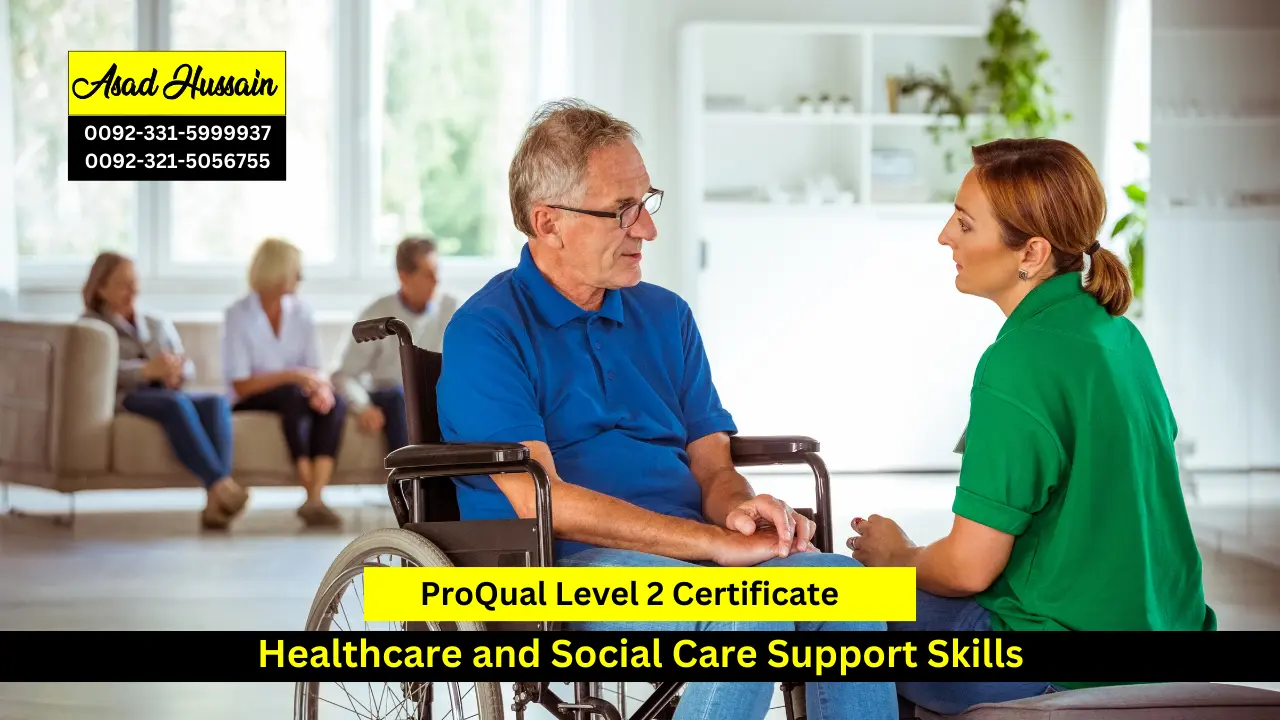The ProQual Level 2 Certificate in Healthcare and Social Care Support Skills provides a comprehensive foundation for individuals seeking to begin or progress within the care sector. This nationally recognised programme equips learners with the essential theoretical knowledge and practical understanding required to deliver safe, effective, and compassionate support. The curriculum covers core areas such as communication, duty of care, safeguarding, equality and inclusion, as well as the fundamental principles of person-centred practice. Successful completion confirms that an individual possesses the baseline competencies necessary to work under supervision within a range of health and social care settings, forming a solid platform for professional development.
This qualification emphasises the development of transferable skills that are highly valued across the care continuum. Participants will explore topics including mental health awareness, learning disability support, and the promotion of dignity in care. The content is designed to be both accessible and rigorous, enabling learners to build confidence in their abilities while understanding the importance of regulatory compliance and ethical practice. Assessment is conducted through portfolio building, allowing candidates to demonstrate their understanding through written tasks and reflective accounts, ensuring the qualification remains relevant to real-world working environments and current industry standards.
The ProQual Level 2 Certificate in Healthcare and Social Care Support Skills is an ideal choice for those wishing to formalise their experience or change career paths within the caring professions. Upon achievement, learners may choose to pursue further certifications in specialised areas such as dementia care, palliative care, or adult support services, as well as more advanced diplomas that explore leadership and management functions. This qualification stands alone as a meaningful marker of commitment and capability, opening doors to enhanced employment opportunities while ensuring that the highest standards of care are consistently maintained across all service delivery areas.
Program Highlights
Study Units
To achieve the qualification candidates must achieve a minimum of 13 credits: a minimum of 8 credits must be from the Level 2 units and the remaining 5 credits can be from any combination of units from the Level 2 or Level 3 or Level 4 units
| Sr# | Unit Title | Credit Value | GLH |
|---|---|---|---|
| 1 | Implement person centred approaches in health and social care | 5 | 33 |
| 2 | Principles of safeguarding and protection in health and social care | 3 | 26 |
| 3 | Assist in the administration of medication | 4 | 25 |
| 4 | Carry out personal hygiene for individuals unable to care for themselves | 3 | 23 |
| 5 | Support individuals with speech and language disorders to develop their communication skills | 4 | 28 |
| 6 | Perform the non-scrubbed circulating role for perioperative procedures | 3 | 23 |
| 7 | Minimise the risk of infection when transporting and storing healthcare waste | 3 | 20 |
| 8 | Assist in the issuing of prescribed items | 3 | 15 |
| 9 | Assist in the manufacture and assembly of medicinal products | 7 | 20 |
| 10 | Assist in the preparation of documentation, materials and other items for manufacture and assembly of medicinal products | 10 | 40 |
| 11 | Support individuals to carry out their own health care procedures | 2 | 15 |
| 12 | Provide support for therapy sessions | 2 | 14 |
| 13 | Contribute to the discharge of individuals to carers | 2 | 14 |
| 14 | Paediatric Emergency First Aid | 1 | 10 |
| 15 | Introduction to communication in health, social care or children’s and young people’s settings | 3 | 23 |
| 16 | Support individuals to meet personal care needs | 2 | 16 |
| 17 | Contribute to the safe use of medical devices in the perioperative environment | 4 | 29 |
| 18 | Causes and Spread of Infection | 2 | 20 |
| 19 | Prepare documentation, materials, components and other items for the preparation of aseptic products | 6 | 10 |
| 20 | Introduction to duty of care in health, social care or children’s and young people’s settings | 1 | 9 |
| 21 | Provide support for mobility | 2 | 14 |
| 22 | Assist others to plan presentations | 2 | 16 |
| 23 | Order Routine Pharmaceutical Stock | 3 | 11 |
| 24 | Dementia Awareness | 2 | 17 |
| 25 | Move and position individuals in accordance with their plan of care | 4 | 26 |
| 26 | Support individuals to manage continence | 3 | 19 |
| 27 | Handle information in health and social care settings | 1 | 10 |
| 28 | The role of the health and social care worker | 2 | 14 |
| 29 | Obtain and test specimens from individuals | 2 | 12 |
| 30 | Prepare individuals for healthcare activities | 3 | 17 |
| 31 | Assist in planning and evaluating learning activities | 3 | 22 |
| 32 | Assist the practitioner to carry out health care activities | 2 | 13 |
| 33 | Minimise the risk of infection during the removal of used linen | 2 | 15 |
| 34 | Inform an individual of discharge arrangements | 2 | 13 |
| 35 | Understand the context of supporting individuals with learning disabilities | 4 | 35 |
| 36 | Select and wear appropriate personal protective equipment for work in health care settings | 2 | 15 |
| 37 | Monitor and maintain the environment and resources during and after clinical / therapeutic activities | 3 | 20 |
| 38 | Prepare and dress for scrubbed clinical roles | 4 | 28 |
| 39 | Care for individuals with naso-gastric tubes | 3 | 20 |
| 40 | The principles of Infection Prevention and Contro | 3 | 30 |
| 41 | Assist with the provision of a pharmacy service to meet individuals’ needs | 3 | 10 |
| 42 | Contribute to the effectiveness of teams | 3 | 5 |
| 43 | Introduction to personal development in health, social care or children’s and young people’s settings | 3 | 23 |
| 44 | Support individuals who are distressed | 3 | 21 |
| 45 | Support individuals undergoing healthcare activities | 3 | 22 |
| 46 | Prepare equipment for intraoperative cell salvage blood processing | 4 | 26 |
| 47 | Assist in receiving, handling and dispatching clinical specimens | 2 | 17 |
| 48 | Assist in the sale of medicines and products | 8 | 50 |
| 49 | Receive Pharmaceutical Stock | 3 | 9 |
| 50 | Prepare aseptic products | 10 | 40 |
| 51 | Prepare and apply dressings and drains to individuals in the perioperative environment | 2 | 18 |
| 52 | Planning and Monitoring Work | 2 | 8 |
| 53 | Cleaning, Decontamination and Waste Management | 2 | 20 |
| 54 | Ensure your own Actions Reduce risks to Health and Safety | 2 | 8 |
| 55 | Introduction to equality and inclusion in health, social care or children’s and young people’s settings | 2 | 20 |
| 56 | Provide agreed support for foot care | 3 | 23 |
| 57 | Contribute to health and safety in health and social care | 4 | 33 |
| 58 | Support independence in the tasks of daily living | 5 | 33 |
| 59 | Prepare equipment for intraoperative cell salvage blood collection | 2 | 17 |
| 60 | Maintaining quality standards in the health sector | 1 | 8 |
| 61 | Emergency First Aid Skills | 1 | 10 |
| 62 | Assemble prescribed items | 3 | 15 |
| 63 | Support participation in learning and development activities | 3 | 23 |
| 64 | Provide support for sleep | 2 | 13 |
| 65 | Remove wound closure materials | 3 | 24 |
| 66 | Support individuals to eat and drink | 2 | 15 |
| 67 | Undertake agreed pressure area care | 4 | 30 |
| 68 | Meet food safety requirements when providing food and drink for individuals | 2 | 15 |
| 69 | Understand loss and grief in end of life care | 3 | 22 |
| 70 | Understand how to work in end of life care | 3 | 28 |
| 71 | Service improvements in the health sector | 2 | 15 |
| Sr# | Unit Title | Credit Value | GLH |
|---|---|---|---|
| 1 | Work with babies and young children to promote their development and learning | 6 | 45 |
| 2 | Engage in personal development in health, social care or children’s and young people’s settings | 3 | 10 |
| 3 | Support individuals with multiple conditions and/or disabilities | 4 | 31 |
| 4 | Support individuals who are bereaved | 4 | 30 |
| 5 | Prepare for and carry out extended feeding techniques | 4 | 27 |
| 6 | Provide support to continue recommended therapies | 3 | 20 |
| 7 | Insert and secure nasogastric tubes | 4 | 30 |
| 8 | Develop positive relationships with children and young people | 4 | 30 |
| 9 | Provide advice and information to enable parents to promote the health and well-being of their newborn babies | 3 | 22 |
| 10 | Facilitate and monitor housing and accommodation services to support individuals with mental health needs | 5 | 32 |
| 11 | Collaborate in the assessment of environmental and social support in the community | 4 | 23 |
| 12 | Influencing Others at Work | 1 | 6 |
| 13 | Care for the physical and nutritional needs of babies and young children | 6 | 45 |
| 14 | Support families who have a child with a disability | 3 | 23 |
| 15 | Support individuals to manage their finances | 3 | 20 |
| 16 | Obtain venous blood samples | 3 | 24 |
| 17 | Implement therapeutic group activities | 4 | 25 |
| 18 | Collate and communicate health information to individuals | 3 | 20 |
| 19 | Provide information and advice to individuals on eating to maintain optimum nutritional status | 5 | 38 |
| 20 | Assist in the implementation of programmes to increase mobility, movement and functional independence | 4 | 28 |
| 21 | Receive and handle clinical specimens within the sterile field | 4 | 30 |
| 22 | Prepare anaesthetic environment and provide support for pre and post-operative anaesthesia and recovery | 5 | 38 |
| 23 | Make recommendations for the use of physical resources in a health setting | 5 | 33 |
| 24 | Maintaining quality standards in the health sector | 2 | 13 |
| 25 | Understand Models of Disability | 3 | 26 |
| 26 | Support individuals to access and use services and facilities | 4 | 25 |
| 27 | Promote and implement health and safety in health and social care | 6 | 43 |
| 28 | Support young people with a disability to make the transition into adulthood | 5 | 40 |
| 29 | Understand mental well-being and mental health promotion | 3 | 14 |
| 30 | Carry out vision screening | 4 | 27 |
| 31 | Assist professionals to support individuals from diverse linguistic and cultural backgrounds to access speech and language therapy services | 5 | 35 |
| 32 | Implement hydrotherapy programmes for individuals and groups | 5 | 35 |
| 33 | Deliver exercise sessions to improve individuals’ health and wellbeing | 5 | 32 |
| 34 | Provide support to the surgical team when preparing individuals for operative and invasive procedures | 4 | 32 |
| 35 | Facilitate person centred assessment, planning, implementation and review | 6 | 45 |
| 36 | Work in partnership with families to support individuals | 4 | 27 |
| 37 | Support individuals to develop and run support groups | 3 | 24 |
| 38 | Monitor own work practice in health, social care or children’s and young people’s settings | 3 | 20 |
| 39 | Perform first line calibration on clinical equipment to ensure it is fit for use | 3 | 20 |
| 40 | Monitor and review individuals progress in relation to maintaining optimum nutritional status | 3 | 26 |
| 41 | Give presentations to groups | 4 | 26 |
| 42 | Support individuals in undertaking their chosen activities | 4 | 24 |
| 43 | Control the use of physical resources in a health setting | 3 | 25 |
| 44 | Support children and young people experiencing transitions | 3 | 28 |
| 45 | Promote communication in health, social care or children’s and young people’s settings | 3 | 10 |
| 46 | Contribute to the prevention of aggressive and abusive behaviour of people | 4 | 26 |
| 47 | Service improvement in the health sector | 3 | 20 |
| 48 | Understand the process and experience of dementia | 3 | 22 |
| 49 | Understand Physical Disability | 3 | 22 |
| 50 | Support individuals with a learning disability to access healthcare | 3 | 25 |
| 51 | Undertake urethral catheterisation processes | 4 | 28 |
| 52 | Promote good practice in handling information in health and social care settings | 2 | 16 |
| 53 | Understand mental health problems | 3 | 14 |
| 54 | Perform routine Electrocardiograph ECG Procedures | 4 | 30 |
| 55 | Undertake treatments and dressings of lesions and wounds | 4 | 25 |
| 56 | Adapt and fit healthcare equipment, medical devices, assistive technology, or products, to meet individuals’ needs | 6 | 37 |
| 57 | Administer oral nutritional products to individuals | 5 | 35 |
| 58 | Promote effective communication with individuals with sensory loss | 4 | 30 |
| 59 | Work with other professionals and agencies to support individuals with physical disability | 3 | 23 |
| 60 | Support individuals to access housing and accommodation services | 4 | 24 |
| 61 | Identify information requirements in a health context | 4 | 30 |
| 62 | Prepare and reproduce permanent radiographic images | 4 | 23 |
| 63 | Develop and prepare speech and language therapy resources for alternative and augmentative communication AAC use | 4 | 25 |
| 64 | Carry out wound drainage care | 4 | 32 |
| 65 | Prepare and provide surgical instrumentation and supplementary items for the surgical team | 6 | 43 |
| 66 | Care for a newly born baby when the mother is unable to do so | 4 | 32 |
| 67 | Understand Child and Young Person Development | 4 | 30 |
| 68 | Provide support to maintain and develop skills for everyday life | 4 | 28 |
| 69 | Facilitate learning and development activities to meet individual needs and preferences | 5 | 35 |
| 70 | Enable individuals with behavioural difficulties to develop strategies to change their behaviour | 8 | 41 |
| 71 | Reprocess endoscopy equipment | 4 | 30 |
| 72 | Support individuals with cognition and learning difficulties | 5 | 34 |
| 73 | Assist in testing individuals’ abilities prior to planning physical activities | 5 | 38 |
| 74 | Support individuals to manage dysphagia | 5 | 35 |
| 75 | Provide advice on foot care for individuals with diabetes | 3 | 23 |
| 76 | Transport, transfer and position individuals and equipment within the perioperative environment | 5 | 32 |
| 77 | Understand Sensory Loss | 3 | 21 |
| 78 | Support families who are affected by Acquired Brain Injury | 3 | 30 |
| 79 | Support individuals during a period of change | 4 | 29 |
| 80 | Perform intravenous cannulation | 4 | 34 |
| 81 | Care for individuals with urethral catheters | 4 | 30 |
| 82 | Conduct routine maintenance on clinical equipment | 4 | 30 |
| 83 | Assist and support individuals to use alternative and augmentative communication systems _AAC | 5 | 35 |
| 84 | Measure and record individuals’ body fluid balance in a perioperative environment | 4 | 23 |
| 85 | Support parents/carers to interact with and care for their newborn baby | 4 | 30 |
| 86 | Deliver training through demonstration and instruction | 3 | 21 |
| 87 | Principles for implementing duty of care in health, social care or children’s and young people’s settings | 1 | 5 |
| 88 | Promote Child and Young Person Development | 3 | 25 |
| 89 | Develop and sustain effective working relationships with staff in other agencies | 4 | 24 |
| 90 | Undertake physiological measurements | 3 | 23 |
| 91 | Undertake stoma care | 4 | 30 |
| 92 | Assure the effective functioning of radiographic image processing equipment | 4 | 25 |
| 93 | Operate equipment for intraoperative cell salvage blood collection | 5 | 40 |
| 94 | Advise and inform individuals on managing their condition | 5 | 31 |
| 95 | Assist others to monitor individuals’ progress in managing dysphagia | 5 | 38 |
| 96 | Support carers to meet the care needs of individuals | 5 | 30 |
| 97 | Maintain pharmaceutical stock | 3 | 4 |
| 98 | Anatomy and Physiology for Maternity Support Workers | 2 | 20 |
| 99 | Receive prescriptions from individuals | 3 | 15 |
| 100 | Understand how to support individuals with autistic spectrum conditions | 3 | 28 |
| 101 | Support Individuals with Specific Communication Needs | 5 | 35 |
| 102 | Obtain and test capillary blood samples | 4 | 30 |
| 103 | Support individuals at the end of life | 7 | 53 |
| 104 | Contribute to effective multidisciplinary team working | 3 | 20 |
| 105 | Analyse and present health related data and information | 4 | 30 |
| 106 | Remove wound drains | 4 | 27 |
| 107 | Develop activities and materials to enable individuals to reach specific communication goals | 5 | 38 |
| 108 | Operate equipment for intraoperative cell salvage blood processing and complete intraoperative cell salvage blood process | 5 | 39 |
| 109 | Support parents/carers and those in a parental role to care for babies during their first year | 5 | 36 |
| 110 | Obtain a client history | 3 | 22 |
| 111 | Manage the availability of physical resources to meet service delivery needs in a health setting | 5 | 33 |
| 112 | Administer medication to individuals, and monitor the effects | 5 | 30 |
| 113 | Assist in the Issuing of Pharmaceutical Stock | 4 | 5 |
| 114 | Undertake an in-process accuracy check of assembled prescribed items prior to the final accuracy check | 4 | 11 |
| 115 | Promote equality and inclusion in health, social care or children’s and young people’s settings | 2 | 8 |
| 116 | Understand the impact of Acquired Brain Injury on individuals | 3 | 28 |
| 117 | Support individuals to live at home | 4 | 25 |
| 118 | Promote person centred approaches in health and social care | 6 | 41 |
| 119 | Undertake tissue viability risk assessments | 3 | 26 |
| 120 | Interact with and support individuals using telecommunications | 5 | 36 |
| 121 | Manufacture equipment or medical devices for individuals within healthcare | 4 | 30 |
| 122 | Provide support for individuals with communication and interaction difficulties | 5 | 39 |
| 123 | Monitor individuals’ progress in relation to managing their body weight and nutrition | 3 | 26 |
| 124 | Assist in implementing treatment programmes for individuals with severely reduced movement/mobility | 5 | 29 |
| 125 | Assist in the delivery of perioperative care and support to individuals | 4 | 31 |
| 126 | Examine the feet of individuals with diabetes | 4 | 32 |
| Sr# | Unit Title | Credit Value | GLH |
|---|---|---|---|
| 1 | Support disabled children and young people and those with specific requirements | 6 | 45 |
| 2 | Enable children and young people to understand their health and well-being | 5 | 38 |
| 3 | Develop and agree individualised care plans for babies and families | 5 | 38 |
Entry Requirements
There are no formal barriers to beginning this qualification, and the following requirements are designed to be inclusive whilst ensuring that all learners can successfully engage with the programme content and assessment methods.
- Age Requirements: Learners must be at least 16 years of age. This ensures that individuals have the maturity and emotional resilience required to engage with topics relating to vulnerability, safeguarding, and the provision of dignified care.
- Educational Background: While no specific prior qualifications are mandatory, learners may benefit from having completed foundational certifications such as the Level 1 Award in Introduction to Health and Social Care or basic first aid qualifications. Relevant diplomas at a comparable level, including those in customer service or childcare, also provide a helpful knowledge base.
- Language Proficiency: Learners require a functional level of literacy in English, as the course involves written assignments, reflective accounts, and the interpretation of care documentation. A minimum equivalent to Entry Level 3 or GCSE grade D/3 in English is recommended, though reasonable adjustments and additional support can be made available where necessary.
These entry criteria are intended to be supportive rather than restrictive, ensuring that the qualification remains accessible to a wide range of individuals who share a common commitment to delivering high-quality care. Whether building upon previous certifications such as the Level 2 Certificate in Preparing to Work in Adult Social Care or beginning a new professional journey, all learners are welcomed onto a programme that values dedication and potential over prior experience alone.
The learning outcomes for the ProQual Level 2 Certificate in Healthcare and Social Care Support Skills are designed to ensure that learners acquire the necessary knowledge and skills to provide effective support in healthcare and social care settings. The outcomes are as follows:
- Understand the Healthcare and Social Care Environment:
- Identify the key roles and responsibilities of healthcare and social care workers.
- Explain the importance of person-centered care in the healthcare and social care sector.
- Recognize the rights and choices of individuals receiving care and support.
- Promote Communication and Interpersonal Skills:
- Demonstrate effective communication techniques in healthcare and social care settings.
- Foster positive interpersonal relationships with service users, colleagues, and other stakeholders.
- Recognize the significance of confidentiality and privacy in healthcare and social care interactions.
- Support the Well-being of Individuals:
- Identify factors that contribute to the physical and emotional well-being of individuals.
- Assist individuals in maintaining their independence and dignity.
- Provide support for individuals with specific needs, including those with disabilities and mental health issues.
- Safeguarding and Protecting Individuals:
- Understand the principles and practices of safeguarding in healthcare and social care.
- Recognize signs of abuse and neglect and know how to report concerns.
- Comply with legal and ethical responsibilities to protect the well-being of service users.
- Support the Implementation of Infection Control:
- Understand the principles of infection control and their significance in healthcare.
- Apply appropriate infection control measures to prevent the spread of infections.
- Maintain a clean and hygienic environment to ensure the safety of service users.
- Contribute to the Care Planning Process:
- Participate in the development and implementation of care plans for individuals.
- Work collaboratively with multidisciplinary teams to meet the diverse needs of service users.
- Document and report on the progress and changes in the care of individuals.
- Promote Health and Safety in the Workplace:
- Identify potential health and safety risks in the healthcare and social care environment.
- Demonstrate knowledge of relevant health and safety regulations and procedures.
- Implement measures to create a safe and secure workplace for both service users and colleagues.
- Reflect on and Develop Personal Practice:
- Engage in reflective practice to evaluate and enhance personal skills and knowledge.
- Seek opportunities for professional development and continuous improvement.
- Comply with ethical and legal standards in the healthcare and social care sector.
- Contribute to a Positive Team Working Environment:
- Collaborate effectively with colleagues to provide high-quality care and support.
- Promote a positive team culture that values diversity and inclusivity.
- Address conflicts and challenges in a constructive and respectful manner.
These learning outcomes are designed to equip learners with the fundamental skills and knowledge needed to excel in healthcare and social care support roles while maintaining a strong commitment to ethical and professional standards.
Target Audiences
The ProQual Level 2 Certificate in Healthcare and Social Care Support Skills is designed for individuals who are either new to the care sector or already working in entry-level support roles and wish to formalise their knowledge and skills. This qualification is suitable for anyone committed to delivering compassionate, person-centred care and seeking to establish a recognised foundation for their professional development within health and social care environments.
- New Entrants to the Care Sector – Individuals looking to begin a career in healthcare or social care who require a nationally recognised qualification to demonstrate their readiness for employment in support worker, care assistant, or domiciliary care roles.
- Existing Support Workers and Care Assistants – Those already employed in roles such as residential care workers, home care assistants, or day service supporters who wish to gain a formal certificate that confirms their competence and enhances their professional confidence.
- Volunteers in Care Settings – Unpaid carers or volunteers working in hospices, community groups, or charitable organisations who want to validate their practical experience and develop a deeper understanding of best practice in care provision.
- School Leavers and Career Changers – Individuals aged 16 and above who are exploring the caring professions as a long-term career pathway and require an accessible, entry-level qualification that opens doors to employment and further certifications.
- Individuals with Related Diplomas or Certificates – Learners who already hold qualifications in areas such as Level 1 Award in Introduction to Health and Social Care, basic safeguarding certificates, or diplomas in childcare and early years, and wish to build upon this foundation with a more comprehensive care-focused programme.
This qualification is for anyone who believes that quality care changes lives and is ready to take the first meaningful step towards making a difference. Whether you are just leaving school, returning to work, or seeking recognition for the vital work you already do, this certificate welcomes your ambition and supports your growth every step of the way.







